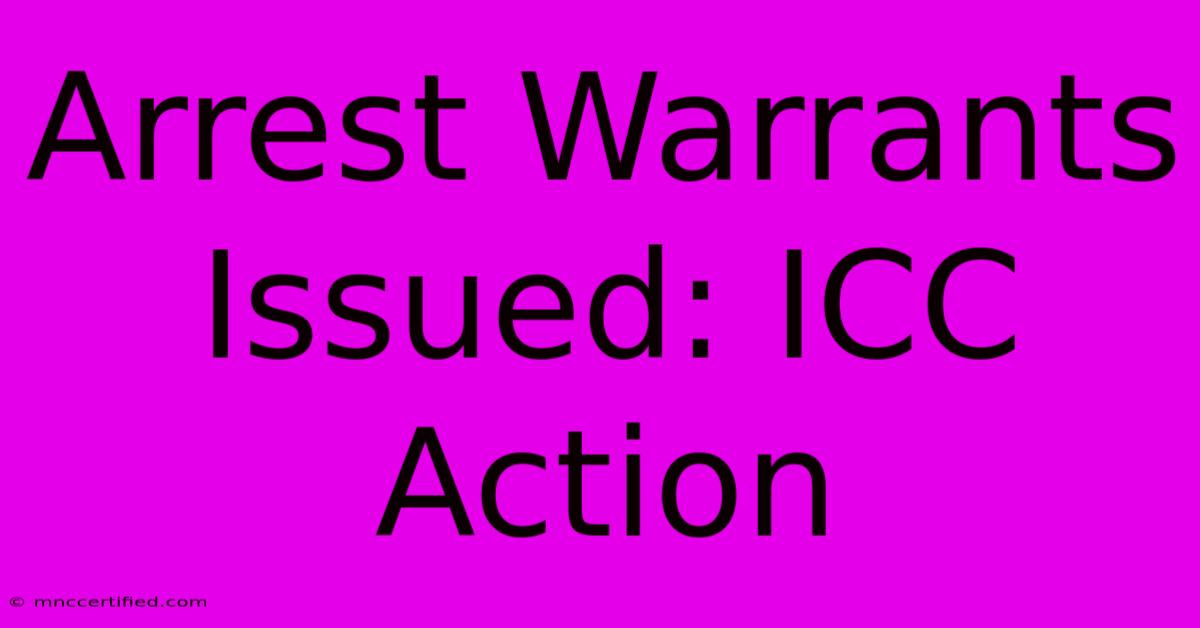Arrest Warrants Issued: ICC Action

Table of Contents
Arrest Warrants Issued: Understanding the ICC's Action and its Implications
The International Criminal Court (ICC) recently issued arrest warrants, sparking global debate and raising crucial questions about international law, sovereignty, and the pursuit of justice. This article delves into the intricacies of these arrest warrants, exploring their implications and the broader context of the ICC's role in international affairs.
Understanding the ICC's Mandate
The International Criminal Court is an independent, permanent court established to investigate and prosecute individuals for the most serious crimes of international concern, namely:
- Genocide: Acts committed with intent to destroy, in whole or in part, a national, ethnical, racial or religious group.
- Crimes against humanity: Widespread or systematic attacks against a civilian population.
- War crimes: Grave breaches of the Geneva Conventions of 1949.
- The crime of aggression: Planning, preparation, initiation or execution, by a person in a position effectively to exercise control over or to direct the political or military action of a State, of an act of aggression.
The ICC's jurisdiction is triggered when a state party refers a situation, the UN Security Council refers a situation, or the Prosecutor initiates an investigation propria motu (on their own initiative). Importantly, the ICC only prosecutes individuals, not states.
Recent Arrest Warrants: A Case Study
(This section needs to be updated with the specific details of the most recent warrants. Replace the bracketed information below with the relevant specifics, including names, charges, and countries involved. Remember to cite credible news sources)
[Specific details of the recent arrest warrants issued by the ICC. Include the names of the individuals, the charges against them, the countries involved, and a brief summary of the alleged crimes.] This situation highlights the [explain the specific legal issue involved, e.g., challenges to state sovereignty, jurisdictional disputes, etc.]. The arrest warrants have [describe the immediate impact, e.g., sparked international condemnation, led to diplomatic tensions, etc.].
The Challenges of Enforcement
Enforcing ICC arrest warrants presents significant challenges. The ICC relies on the cooperation of member states for arrests and transfers. Many countries, including powerful nations, are not ICC members or have expressed reservations about its jurisdiction. This can lead to situations where individuals indicted by the ICC remain at large, undermining the court's authority and its ability to deliver justice. The [mention specific instances of non-cooperation or resistance to warrants] illustrate this challenge.
The Debate on Sovereignty versus Accountability
The ICC's actions often raise concerns about national sovereignty. Some argue that the court's interventions interfere with the domestic affairs of states, potentially jeopardizing their ability to govern themselves. Others maintain that the ICC plays a vital role in holding individuals accountable for atrocities that transcend national borders, filling a critical gap in the international justice system. This ongoing debate underscores the complex interplay between international law and national interests.
The Future of the ICC and its Impact
The future of the ICC depends on its ability to secure cooperation from states and maintain its credibility. Efforts to strengthen the court's legitimacy and effectiveness, including [mention specific initiatives, e.g., reforms, improved cooperation mechanisms, etc.], are crucial. The long-term impact of the ICC's actions will depend on the success of these efforts and the evolving international landscape. The [mention long-term implications of ICC actions, e.g., impact on international relations, potential for deterring future atrocities, etc.] will continue to shape the international legal order.
Conclusion
The issuance of arrest warrants by the ICC is a complex event with significant implications for international law, justice, and global politics. While challenges remain, the ICC's efforts to hold individuals accountable for grave crimes represent a vital step towards a more just and accountable world. Continued dialogue and cooperation are essential to navigate the complexities of international justice and ensure the long-term success of the ICC.
Keywords: ICC, International Criminal Court, arrest warrant, genocide, crimes against humanity, war crimes, crime of aggression, international law, international justice, sovereignty, accountability, enforcement, cooperation, diplomacy, international relations.

Thank you for visiting our website wich cover about Arrest Warrants Issued: ICC Action. We hope the information provided has been useful to you. Feel free to contact us if you have any questions or need further assistance. See you next time and dont miss to bookmark.
Featured Posts
-
Renters Insurance St George Utah
Nov 22, 2024
-
Dental Insurance That Covers Tmj
Nov 22, 2024
-
Cnbc India Adanis Us Fraud Accusations
Nov 22, 2024
-
Does Insurance Cover Hgh Therapy
Nov 22, 2024
-
America States Insurance Company
Nov 22, 2024